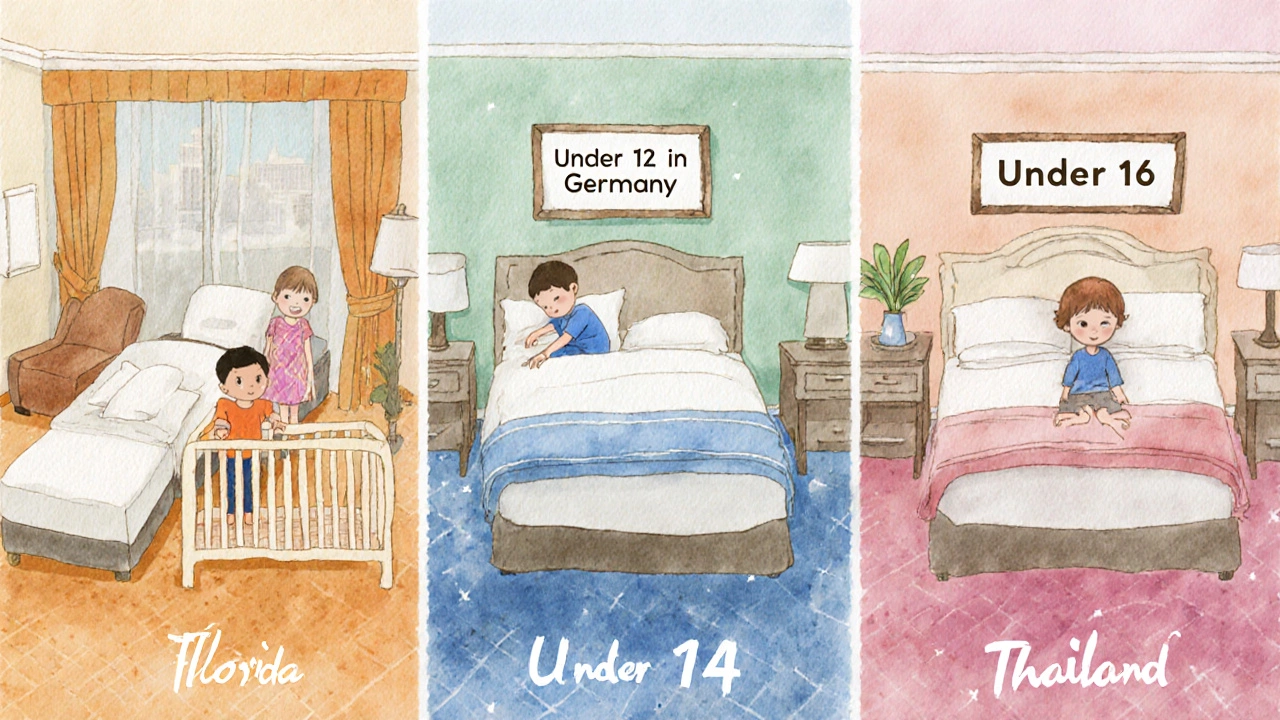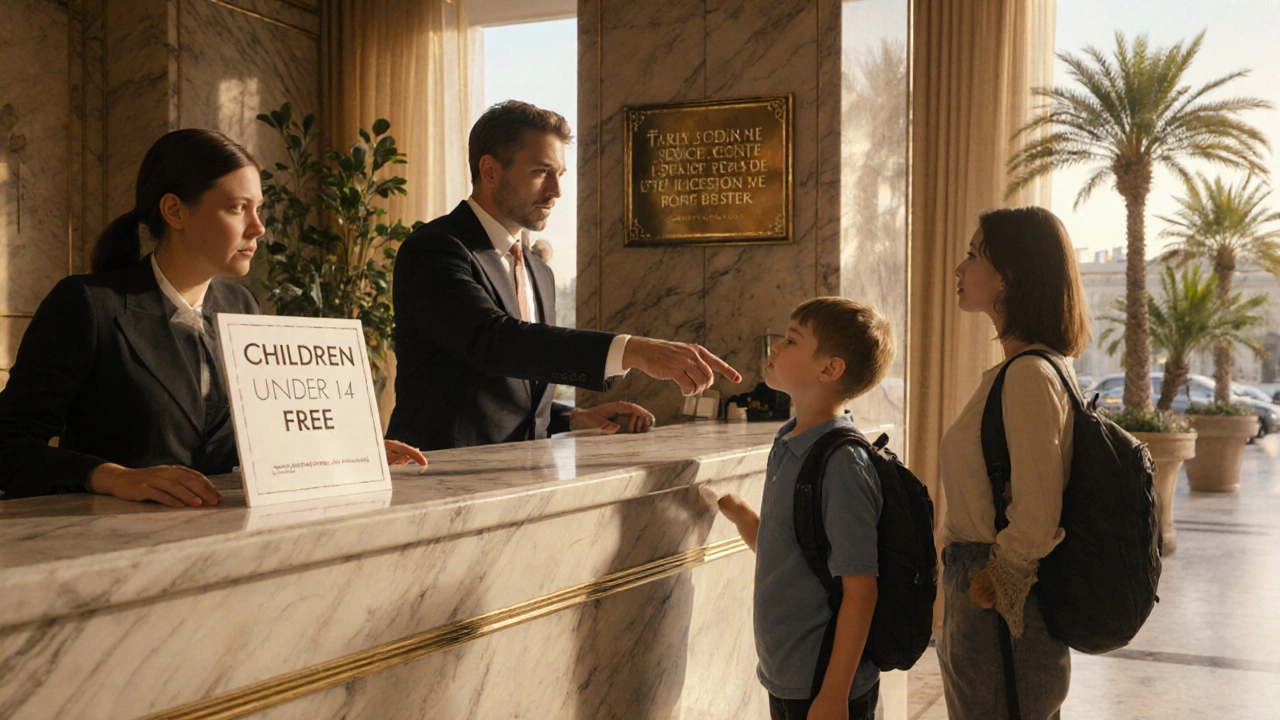When you’re booking a family trip, one of the biggest surprises isn’t the price-it’s the child age policy. You assume your 11-year-old qualifies for a free breakfast or a crib at no extra cost. But when you get to the front desk, they say, "Sorry, kids over 10 pay full price." It happens more often than you think.
There’s No Universal Rule
Hotels don’t follow one global standard for what counts as a child. Unlike airlines, which have clear rules based on international aviation laws, hotels set their own policies. A 12-year-old might be considered a child at a resort in Florida but an adult at a luxury hotel in Paris. Even within the same chain, policies can vary by country or even by property.
Most hotels in the U.S., Canada, and Australia define a child as someone under 12. But in Europe, especially in countries like Germany or Italy, the cutoff is often 14. In Southeast Asia, some resorts treat anyone under 16 as a child-even if they’re taller than their parents.
The reason? It’s not about safety or legal definitions. It’s about revenue. Hotels know families will pay more if they’re forced to book two rooms or an extra bed. So they tweak the rules to maximize profit while still sounding family-friendly.
What Does "Child" Actually Mean?
When a hotel says "child," they’re usually referring to three things:
- Free or discounted meals
- Free use of existing bedding (no extra bed needed)
- Free access to kids’ clubs, pools, or activities
Some hotels let kids under 5 stay for free and eat for free. Others extend that to 12. But if your child is 8 and sleeps in your room on a pull-out sofa, they might still be counted as a child. If they’re 11 and need a separate bed, suddenly they’re an adult in the hotel’s eyes.
Don’t assume "child" means the same as "minor" under the law. A 17-year-old is still a minor in most places, but most hotels treat them as an adult for pricing. The legal definition of a child doesn’t matter here-only the hotel’s internal policy does.
How to Find Out Before You Book
The worst mistake families make? Assuming the website says it all. Booking sites like Expedia or Booking.com often list "free stay for children under 12"-but that’s just a default. The real policy is buried in the fine print or only revealed when you call.
Here’s how to get the real answer:
- Go to the hotel’s official website-not a third-party booking site.
- Look for a "Family Policies" or "Guest Information" section.
- If you can’t find it, call the hotel directly. Ask: "What’s your age limit for free stays and meals for children?"
- Write down the exact answer: "Children under 12 stay and eat free with paying adult. Extra bed $25 per night."
Pro tip: Ask if the policy changes during holidays. Many hotels raise the age limit during school breaks to fill more rooms. A place that lets kids under 12 stay free in April might only allow under 8 during Christmas week.

Why Do Policies Vary So Much?
It comes down to three factors:
- Location: In countries with high living costs (like Switzerland or Japan), hotels charge for children earlier because room rates are already high. In places like Mexico or Thailand, where labor and food are cheaper, they’re more generous to attract families.
- Hotel type: All-inclusive resorts need to feed kids, so they often allow older children to eat free. Luxury hotels avoid extra kids to keep the vibe quiet and upscale.
- Room size: A standard double room might only fit two adults and one child on a rollaway. If your 10-year-old needs a full-size bed, the hotel will charge you for a third person-even if they’re "under 12."
For example, a family staying at a Marriott in New York might get free breakfast for kids under 12. But at a Marriott in Tokyo, the cutoff is 6. Same brand, totally different rules.
What About Cribs and Extra Beds?
Free cribs are common for babies under 2. But don’t assume they’ll be there. Some hotels require you to request one 48 hours in advance. Others charge $10-$25 per night-even for a basic crib.
Extra beds are even trickier. Most hotels charge for them regardless of age. A 7-year-old sleeping on an extra bed? You’ll pay. A 13-year-old in a twin room with no extra bed? You might still pay extra if the hotel counts them as an adult.
Always ask: "Is there a charge for an extra bed or rollaway?" and "Do you provide cribs?" Write it down. Don’t rely on what the website says.
How to Save Money When Booking
If you’re trying to keep costs down, here’s what works:
- Book a suite or family room. These often include space for three or four people without extra charges.
- Look for hotels that offer "kids stay and eat free" with no age limit-some resorts in Florida and the Caribbean do this.
- Use loyalty programs. Marriott Bonvoy and Hilton Honors often give members free child stays, even if the standard policy says otherwise.
- Book directly with the hotel. Third-party sites rarely show child policy details. Calling or booking on the hotel’s site gives you access to hidden deals.
Also, ask if they offer connecting rooms. Two standard rooms connected by a door can be cheaper than a suite-and you get more space for kids to move around.

What to Do When the Hotel Gets It Wrong
Let’s say you booked a room for two adults and one child under 12. You arrive, and they say, "Your child is 11, so we need to charge for an extra bed." You’re confused-you thought they were free under 12.
Here’s what to do:
- Stay calm. Ask to see the policy in writing-on their website or in your confirmation email.
- If you have proof, politely ask the front desk to honor it. Most managers will fix it if you’re reasonable.
- If they refuse, ask to speak to a supervisor. Mention you’re a repeat guest or loyalty member if you are.
- If it’s a chain hotel, call corporate customer service after you check out. They often refund the charge to keep your business.
Don’t argue at check-in. It won’t help. But if you have documentation, you have leverage.
What About Teens?
Teens are the gray zone. A 14-year-old might be allowed to check in alone in some places, but still charged as a child for meals. Others treat them as adults from age 12.
Many hotels now have teen-specific policies:
- Free access to the pool and kids’ club until 16
- Discounted meals until 17
- Strict curfews for guests under 18
If you’re traveling with a 15-year-old, ask if they have teen-friendly amenities-like game rooms, late-night snack bars, or teen-only pool hours. Some resorts, like those in the Bahamas or Cancun, offer special programs for teens that make the stay worth the extra cost.
Final Tip: Always Confirm in Writing
Never rely on verbal promises. After you call or email the hotel, ask them to confirm the child policy in writing via email. Save it. Print it. Keep it with your travel documents.
When you arrive, show the front desk your email: "This says my 11-year-old stays and eats free. Can we confirm that’s still correct?" Most of the time, they’ll say yes. If not, you’ve already protected yourself.
Family travel shouldn’t be a guessing game. Knowing the hotel’s child policy before you book saves stress, money, and time. And that’s worth a quick phone call-or five.

